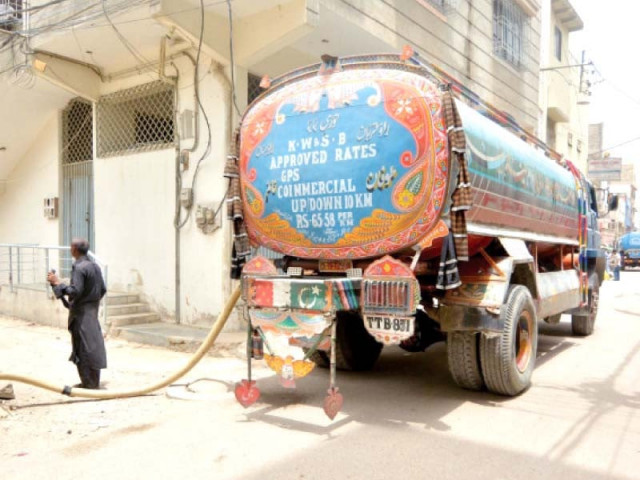Water crisis : City sees growth in tankers as water woes deepen
These behemoth vehicles add to the Karachi’s traffic woes, charge exorbitant rates amid ongoing water shortage

The water-tanker mafia is known to exploit Karachi’s water problems and profit from it, but its growing hold over the port city has now started creating trouble for citizens on the streets.
As the fault lines in the city’s water infrastructure have depended over the years, so has the infiltration of behemoth vehicles transporting stolen water across the city, which take to the crowded streets several times a day. Owing to which, Karachi’s major highways have been experiencing severe traffic issues, have seen an increase in road accidents and have undergone various kinds of damage from influx of heavy vehicles over the last five years.
According to Water Board’s Peoples Labor Union General Secretary Mohsin Raza, in the past, there were 23 official water hydrants in the city, but the number of tankers and the trips they made were relatively low. Now, he says, there are just seven water hydrants under the supervision of Karachi Water and Sewerage Board (KWSB), and one hydrant under the NLC. “Under the supervision of the water board, there are over 50,000 daily trips of tankers to the seven hydrants, which accounts for over 20-30 million gallons of water that reaches people via tankers,” he told adding that not all of these tankers fill from the government’s hydrant, but also draw water from polluted sources to sell to the people at exorbitant rates, despite the water board’s efforts of controlling water theft.
A KWSB official speaking on conditions of anonymity revealed that it is not only the frequency and volume of water tankers that has increased on the city’s roads, the fares they charge have also gone through the roof in the last half-a-decade. Per the official, the Supreme Court had formed a water commission in 2015 to resolve water issues in Karachi. At the direction of the Water Commission, the water board gradually eliminated more than 200 illegal water hydrants and groundwater theft networks. On this occasion 17 official hydrants of the water board were also removed and only one hydrant was allowed to be maintained in each district. “However, after the dissolution of the Water Commission, many illegal hydrants were re-established. Dozens of illegal hydrants have been set up in the district west and on the outskirts of the city,” he informed.
The concerned officer said that the hydrants of the water board have been contracted through auction. Their official timing is set at 18 hours but they are operated for 24 hours a day, which means that water tankers continually rush to and from these hydrants.
Water hydrants are supplied to the city through three categories, general Public Service, Commercial Service and Free Tanker Service. General Public Service provides water to the citizens at relatively low rates but a citizen can only avail this service once a week. The rates of commercial tanker service are however seen to vary in different areas, and the contractor receives his desired rates, which have almost doubled in the last year.
According to KWSB spokesperson Abdul Qadir Sheikh, action is being taken against illegal hydrants on the instructions of Sindh Local Government Minister and Water Board Chairperson Syed Nasir Hussain Shah and Vice Chairperson Syed Najmi Alam.
“Immediate action is taken on receipt of information by the department and cases are also registered against the accused in the concerned police stations,” he told, adding that under the agreement reached with the contractors regarding hydrants under the supervision of water board, only 60 tankers are allowed to stand at each hydrant. “The tankers that fall in the commercial category are different and over 10 MGD of water is carried from the hydrants by tankers in total while tankers are added to the city at the rate of nine per cent per annum,” he asserted, while speaking to The Express Tribune.
Published in The Express Tribune, July 4th, 2022.



















COMMENTS
Comments are moderated and generally will be posted if they are on-topic and not abusive.
For more information, please see our Comments FAQ